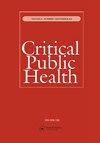Chronicity in/and cancer: a qualitative interview study of health professionals, patients, and family carers
IF 2.3
3区 医学
Q2 PUBLIC, ENVIRONMENTAL & OCCUPATIONAL HEALTH
引用次数: 1
Abstract
ABSTRACT The landscape of cancer is changing, with earlier detection and the emergence of new treatment options signalling the potential reconfiguration of cancer (for some) as a chronic condition. Cancer is increasingly experienced in terms of chronicity, incorporating both ongoing episodes of acute treatment alongside the long-term management of disease, symptoms, and side effects. This emphasis refocuses attention toward living-with, as well as beyond, cancer. Yet, how cancer chronicity is understood and experienced by both patients and healthcare professionals remains underexplored. While sociological scholarship has critically analysed how chronic illness has been positioned as a problem of/for the person and/or the healthcare system, less attention has been paid to instances like cancer, where chronicity might be viewed as reflective of forms of success (e.g. through the deferral of mortality even in the absence of ‘cure’). In this paper we draw on qualitative interview data from a large study of cancer survivorship including patients, their family carers and health professionals, across two Australian hospitals. We critically analyse the dimensions of chronicity in the cancer sphere, understanding cancer-as-chronicity as producing a particular form of subjectivity, shaped by the everyday management and experience of treatment, impairment, symptoms, and side-effects. We posit that constructions of cancer as chronic, and associated imperatives linked to longevity, commitment, and resilience, are placing new demands on patients, family carers, and professionals alike.癌症的慢性病:对卫生专业人员、患者和家庭护理人员的定性访谈研究
摘要癌症的形势正在发生变化,早期检测和新治疗方案的出现表明癌症(对某些人来说)可能会重新构成一种慢性疾病。癌症在慢性方面的经验越来越多,既包括持续的急性治疗,也包括对疾病、症状和副作用的长期管理。这一重点将注意力重新集中在与癌症共存以及超越癌症。然而,患者和医疗保健专业人员对癌症慢性病的理解和体验仍有待进一步探索。虽然社会学学术界对慢性病如何被定位为个人和/或医疗系统的一个问题进行了批判性分析,但对癌症等情况的关注较少,在这些情况下,慢性病可能被视为成功形式的反映(例如,即使在没有“治愈”的情况下,也可以推迟死亡率)。在这篇论文中,我们利用了一项关于癌症生存率的大型研究的定性访谈数据,包括澳大利亚两家医院的患者、他们的家庭护理人员和卫生专业人员。我们批判性地分析了癌症领域的慢性性维度,将癌症作为一种偶然性理解为产生一种特殊形式的主体性,由日常管理和治疗经验、损伤、症状和副作用形成。我们认为,癌症作为慢性疾病的构建,以及与寿命、承诺和恢复力相关的必要性,正在对患者、家庭护理人员和专业人员提出新的要求。
本文章由计算机程序翻译,如有差异,请以英文原文为准。
求助全文
约1分钟内获得全文
求助全文
来源期刊

Critical Public Health
Multiple-
CiteScore
5.90
自引率
7.10%
发文量
36
期刊介绍:
Critical Public Health (CPH) is a respected peer-review journal for researchers and practitioners working in public health, health promotion and related fields. It brings together international scholarship to provide critical analyses of theory and practice, reviews of literature and explorations of new ways of working. The journal publishes high quality work that is open and critical in perspective and which reports on current research and debates in the field. CPH encourages an interdisciplinary focus and features innovative analyses. It is committed to exploring and debating issues of equity and social justice; in particular, issues of sexism, racism and other forms of oppression.
 求助内容:
求助内容: 应助结果提醒方式:
应助结果提醒方式:


